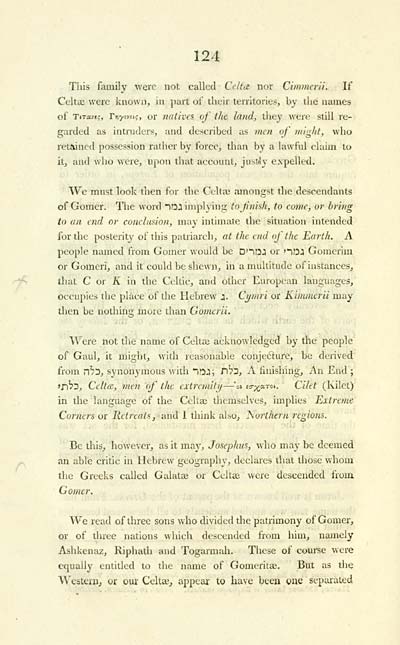Blair Collection > Celtic researches, on the origin, traditions & language, of the ancient Britons
(214)
Download files
Complete book:
Individual page:
Thumbnail gallery: Grid view | List view

124
This family were not called Celtti nor Cunmerii. If
Celtüe were known, in ])art of their territories, by the names
of Ύηχνΐς, ΤΥΓ/ί'ηίς, or n(i(iv€S of the land, they were still re-
garded as intruders, and described as 7nen of might, who
retained possession rather by force, than by a lawful claim to
it, and who were, upon that account, just/ly expelled.
We must look then for the Celta; amongst the descendants
of Gomer. The word nnj implying tojinish, to come, or bring
to an end or conchmon, may intimate the situation intended
for the posterity of this patriarch, at the end of the Earth. A
people named from Gomer would be DnDJ or HDJ Gomcrim
or Gomeri, and it could be shewn, in a multitude of instances,
that C or Κ in the Celtic, and other European languages,
occupies the place of the Hebrew j. Cyrnri or Kimnierii may
then be nothing more than Gomerii.
Were not the name of Celtae acknowledged by the people
of Gaul, it might, with reasonable conjeélure, be derived
from n^D, synonymous with ΊΏ:ι; ri^D, Λ finishing, Λ η End ;
»ΓΟ'2, Celta, men of the extrcmiti/—\i ατχα,τοί. diet (Kilet)
in the language of the Celtaj themselves, implies Extreme
Corners or Retreats, and 1 think also, 'Sorthern regions.
Be this, however, as it may, Josephus, Λνΐιο may be deemed
an able critic in Hebrew geography, declares that those whom
the Greeks called Galatae or Celtae were descended from
Gomer.
We read of three sons w ho divided the patrimony of Gomer,
or of three nations which descended from him, namely
Ashkenaz, Riphath and Togarmah. These of coui^se were
equally entitled to the name of Gomeritae. But as the
\\'cstern; or our Celtae, appeal• to have been çne separated
This family were not called Celtti nor Cunmerii. If
Celtüe were known, in ])art of their territories, by the names
of Ύηχνΐς, ΤΥΓ/ί'ηίς, or n(i(iv€S of the land, they were still re-
garded as intruders, and described as 7nen of might, who
retained possession rather by force, than by a lawful claim to
it, and who were, upon that account, just/ly expelled.
We must look then for the Celta; amongst the descendants
of Gomer. The word nnj implying tojinish, to come, or bring
to an end or conchmon, may intimate the situation intended
for the posterity of this patriarch, at the end of the Earth. A
people named from Gomer would be DnDJ or HDJ Gomcrim
or Gomeri, and it could be shewn, in a multitude of instances,
that C or Κ in the Celtic, and other European languages,
occupies the place of the Hebrew j. Cyrnri or Kimnierii may
then be nothing more than Gomerii.
Were not the name of Celtae acknowledged by the people
of Gaul, it might, with reasonable conjeélure, be derived
from n^D, synonymous with ΊΏ:ι; ri^D, Λ finishing, Λ η End ;
»ΓΟ'2, Celta, men of the extrcmiti/—\i ατχα,τοί. diet (Kilet)
in the language of the Celtaj themselves, implies Extreme
Corners or Retreats, and 1 think also, 'Sorthern regions.
Be this, however, as it may, Josephus, Λνΐιο may be deemed
an able critic in Hebrew geography, declares that those whom
the Greeks called Galatae or Celtae were descended from
Gomer.
We read of three sons w ho divided the patrimony of Gomer,
or of three nations which descended from him, namely
Ashkenaz, Riphath and Togarmah. These of coui^se were
equally entitled to the name of Gomeritae. But as the
\\'cstern; or our Celtae, appeal• to have been çne separated
Set display mode to: Large image | Transcription
Images and transcriptions on this page, including medium image downloads, may be used under the Creative Commons Attribution 4.0 International Licence unless otherwise stated. ![]()
| Early Gaelic Book Collections > Blair Collection > Celtic researches, on the origin, traditions & language, of the ancient Britons > (214) |
|---|
| Permanent URL | https://digital.nls.uk/75766243 |
|---|
| Description | A selection of books from a collection of more than 500 titles, mostly on religious and literary topics. Also includes some material dealing with other Celtic languages and societies. Collection created towards the end of the 19th century by Lady Evelyn Stewart Murray. |
|---|
| Description | Selected items from five 'Special and Named Printed Collections'. Includes books in Gaelic and other Celtic languages, works about the Gaels, their languages, literature, culture and history. |
|---|

